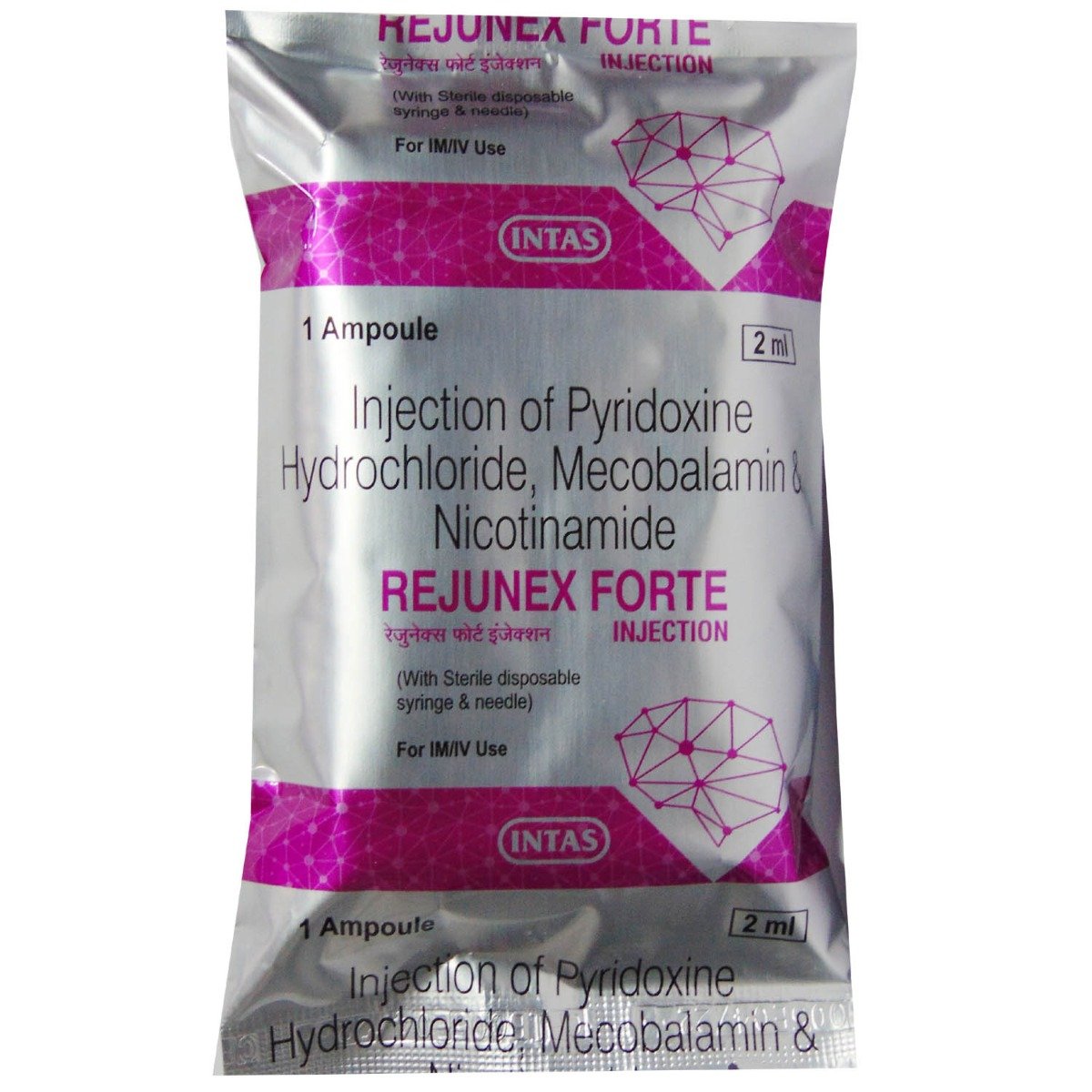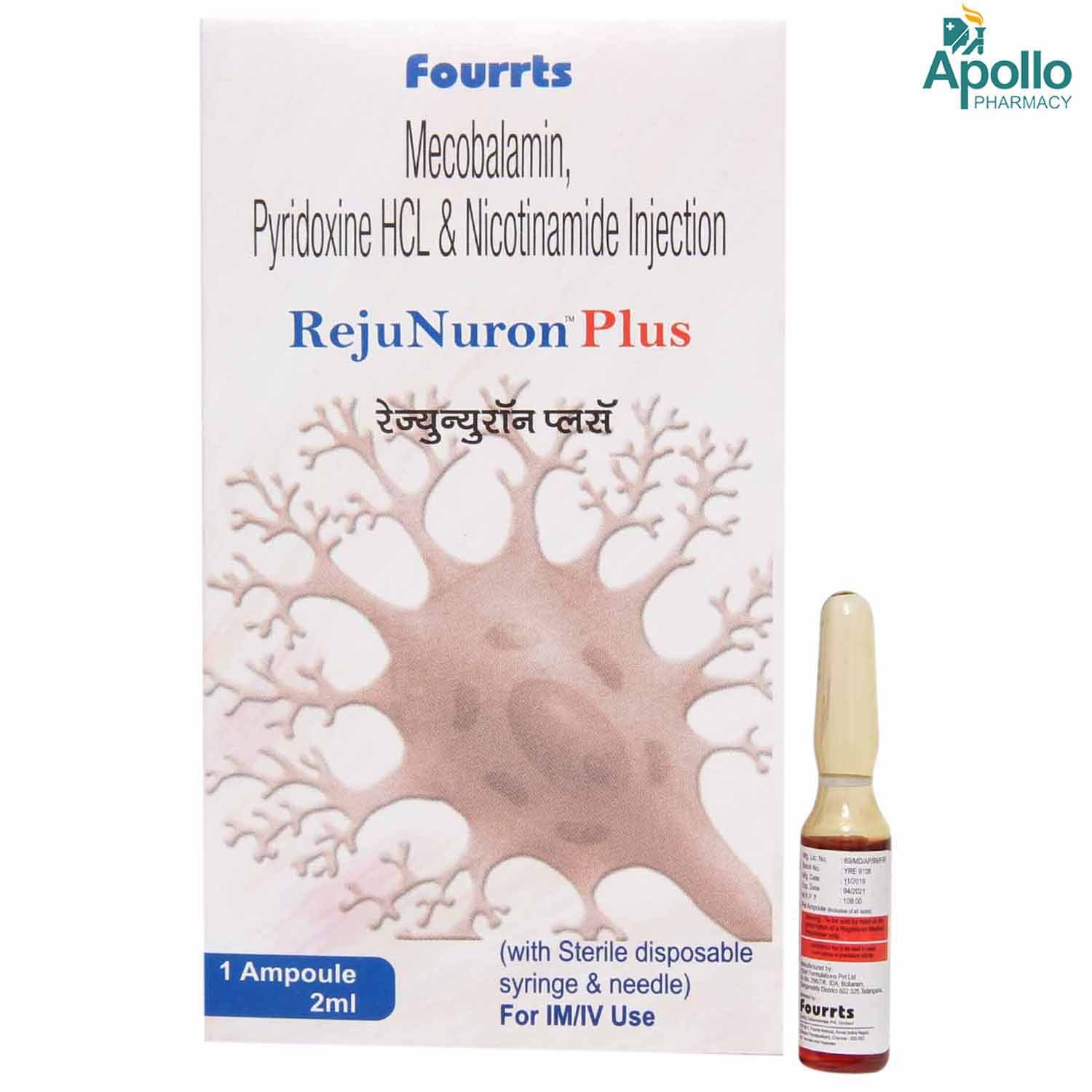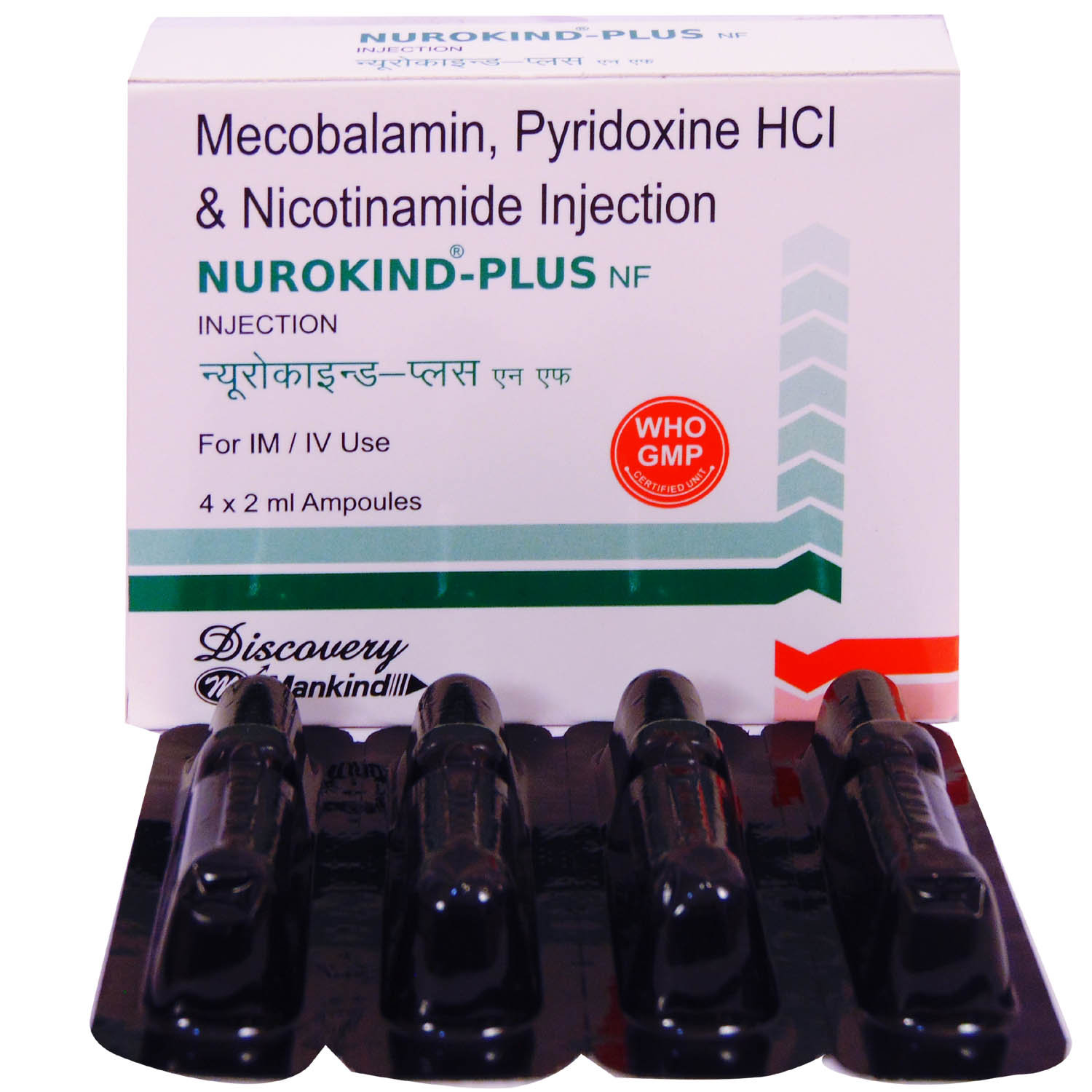Mecobalamin+pyridoxine Hydrochloride+nicotinamide
About Mecobalamin+pyridoxine Hydrochloride+nicotinamide
Mecobalamin+pyridoxine Hydrochloride+nicotinamide belongs to the class of 'multivitamins' primarily used to treat and prevent nutritional deficiencies. Nutritional deficiencies occur when the body does not absorb or get enough vitamins, minerals, and antioxidants from food. Nutrient deficiency can lead to many health problems like a weakened immune system, indigestion, skin problems, heart problem, eye problems and defective bone growth.
Mecobalamin+pyridoxine Hydrochloride+nicotinamide contains Mecobalamin, Nicotinamide, and Pyridoxine hydrochloride. Mecobalamin regulates body functions like cell growth, blood formation, and protein synthesis. Nicotinamide is a form of vitamin B that provides vital nutrients. Pyridoxine hydrochloride is involved in protein, fat, and carbohydrate metabolism and the formation of red blood cells and neurotransmitters.
Take Mecobalamin+pyridoxine Hydrochloride+nicotinamide as advised by your doctor. You may experience common side effects like numbness of your hands or feet, upset stomach, diarrhoea, loss of hunger, and dizziness. Most of these side effects of Mecobalamin+pyridoxine Hydrochloride+nicotinamide do not require medical attention and gradually resolve over time. However, if the side effects are persistent, reach out to your doctor.
Let your doctor know if you are using any other medicines or herbal products before starting Mecobalamin+pyridoxine Hydrochloride+nicotinamide. If you are known to be allergic to any of the components, please inform your doctor. Please tell your doctor if you have malabsorption syndrome (difficulty absorbing nutrition from food). If you are a pregnant or breastfeeding mother, please consult your doctor before taking Mecobalamin+pyridoxine Hydrochloride+nicotinamide.
Uses of Mecobalamin+pyridoxine Hydrochloride+nicotinamide
Medicinal Benefits
Mecobalamin+pyridoxine Hydrochloride+nicotinamide belongs to the class of 'multivitamins' primarily used to treat nutritional deficiencies due to various complications or long-term diseases. It may be used to treat and prevent vitamin B6 deficiency, anaemia (lack of red blood cells), peripheral neuropathy (nerve disorder), seizures (fits), hereditary disorders like hyperoxaluria (excess oxalate levels in urine), and homocystinuria (accumulation of an amino acid called homocysteine in urine and blood). Mecobalamin+pyridoxine Hydrochloride+nicotinamide contains mecobalamin (vitamin B12), nicotinamide, and pyridoxine hydrochloride (vitamin B6). Mecobalamin (Methylcobalamin) is a coenzyme form of vitamin B12, which regulates body functions like cell growth, blood formation, and protein synthesis. Nicotinamide is a form of vitamin B that provides vital nutrients. Pyridoxine hydrochloride is involved in protein, fat, and carbohydrate metabolism, red blood cells, and neurotransmitter formation. Together, Mecobalamin+pyridoxine Hydrochloride+nicotinamide helps treat nutritional deficiencies.
Directions for Use
Storage
Side Effects of Mecobalamin+pyridoxine Hydrochloride+nicotinamide
- Numbness of hands or feet
- Upset stomach
- Diarrhoea
- Loss of hunger
- Dizziness
- Constipation
Drug Warnings
Let your doctor know if you are using any other medicines or herbal products before starting Mecobalamin+pyridoxine Hydrochloride+nicotinamide. Inform your doctor if you are allergic to any of the components. Please inform your doctor if you have malabsorption syndrome (difficulty absorbing nutrition from food), as it may make it hard to absorb B complex vitamins orally. Your doctor may suggest other dosage forms in such a case. Pregnant or breastfeeding women should consult their doctor before taking Mecobalamin+pyridoxine Hydrochloride+nicotinamide.
Drug Interactions
Drug-Drug Interaction: Mecobalamin+pyridoxine Hydrochloride+nicotinamide may interact with anti-cancer drugs (altretamine, cisplatin, arsenic trioxide), fits medicines (phenytoin, phenobarbital), antibiotics (chloramphenicol), and medicines treating Parkinson's disease (levodopa).
Drug-Food Interaction: No interaction found/established.
Drug-Disease Interaction: Use Mecobalamin+pyridoxine Hydrochloride+nicotinamide with medical advice if you have malabsorption syndrome (difficulty absorbing nutrition from food), and Leber's optic atrophy.
Drug-Drug Interactions Checker List:
Safety Advice

Alcohol
cautionIt is not known if alcohol interacts with Mecobalamin+pyridoxine Hydrochloride+nicotinamide. Consult a doctor if you have any concerns.

Pregnancy
cautionLet your doctor know if you are pregnant or planning to conceive before taking Mecobalamin+pyridoxine Hydrochloride+nicotinamide. Your doctor will weigh the risks and benefits before recommending Mecobalamin+pyridoxine Hydrochloride+nicotinamide.

Breast Feeding
cautionPlease consult your doctor before taking Mecobalamin+pyridoxine Hydrochloride+nicotinamide if you are breastfeeding. Your doctor will weigh the risks and benefits before recommending Mecobalamin+pyridoxine Hydrochloride+nicotinamide.

Driving
not applicableNo interactions were found/established.

Liver
cautionIf you have liver disease, consult your doctor before taking Mecobalamin+pyridoxine Hydrochloride+nicotinamide.

Kidney
cautionIf you have kidney impairment, consult your doctor before taking Mecobalamin+pyridoxine Hydrochloride+nicotinamide.

Children
cautionConsult your doctor. Your doctor will recommend Mecobalamin+pyridoxine Hydrochloride+nicotinamide based on your child's condition, age and body weight.
Habit Forming
Diet & Lifestyle Advise
- Try Vitamin B complex food sources like milk, cheese, eggs, chicken, red meat, tuna, mackerel, salmon, shellfish, oysters, clams, dark green vegetables such as spinach and kale, beets, avocados, potatoes, whole grains, cereals, kidney beans, black beans, and chickpea.
- Include fruits like citrus, banana, and watermelon in your diet.
- Avoid smoking and alcohol consumption.
- Exercise regularly, and maintain a healthy lifestyle. Avoid excess fatty foods.
Special Advise
- Clinical monitoring of Vitamin B12 and B6 levels through blood examinations is recommended.
- Let your doctor and the laboratory staff know if you are using Mecobalamin+pyridoxine Hydrochloride+nicotinamide since pyridoxine hydrochloride may interfere with laboratory tests like urine tests for urobilinogen.
Patients Concern
Disease/Condition Glossary
Nutritional deficiencies: Nutritional deficiencies occur when the body does not absorb or get enough nutrients from food. Many nutrients are essential for a healthy life. Sometimes your body is unable to absorb many nutrients even if you are consuming them. Nutrient deficiency can lead to many health problems like a weakened immune system, indigestion, skin problems, heart problem, eye problems and defective bone growth. Nutritional deficiency symptoms include pale skin, fatigue, weakness, trouble breathing, feeling faint, and poor concentration.
Vitamin B6 deficiency: This is developed when your body doesn't have adequate levels of a water-soluble vitamin called Pyridoxine or Vitamin B6. Vitamin B6 deficiency symptoms include fatigue, skin rashes, cracked and sore lips, weak immune system, tiredness, low energy levels, tingling in hands and feet, and fits.
Vitamin B12 deficiency: When your body doesn't have adequate mineral levels called Vitamin B12, it leads to vitamin B12 deficiency. Signs and symptoms of low vitamin B12 include fatigue, breathlessness, numbness, poor balance, and memory trouble.
FAQs
Mecobalamin+pyridoxine Hydrochloride+nicotinamide is a vitamin supplement and consists of Pyridoxine hydrochloride (vitamin B6), Mecobalamin (vitamin B12), and Nicotinamide. When you lack these vitamins, which cannot be recovered even with the food sources, Mecobalamin+pyridoxine Hydrochloride+nicotinamide helps recover levels of these vitamins.
Vitamin B6 deficiency occurs when your body lacks adequate Pyridoxine levels. You can overcome this deficiency by including food sources rich in Pyridoxine, like milk, eggs, beef, pork, chicken or turkey, fish, peanuts, soya beans, wheat germ, oats, and bananas. If your Vitamin B6 levels are still low, your doctor may suggest supplements.
Vitamin B12 deficiency is caused when you don't have enough Methylcobalamin or Mecobalamin levels in your body. You can include natural Vitamin B12 sources like eggs, beef, liver, chicken, trout, salmon, tuna fish, clams, fortified breakfast cereal, low-fat milk, yoghurt, and cheese in your diet for treating this deficiency. If you still have low levels of B12, please consult your doctor about its supplements.
It is important to tell your doctor if you have malabsorption syndrome (difficulty absorbing nutrition from food) since it may be hard to absorb Vitamin B6 through oral administration. Your doctor may advise on other dosage forms in such a case. Do not take Mecobalamin+pyridoxine Hydrochloride+nicotinamide if you are allergic to pyridoxine hydrochloride, nicotinamide and mecobalamin, have eye problems (Leber's optic atrophy), or take levodopa for Parkinson’s disease.
Pyridoxine hydrochloride in this medicine may interfere with laboratory tests like urine tests for urobilinogen. Please make sure your doctor and the laboratory staff know that you take Mecobalamin+pyridoxine Hydrochloride+nicotinamide before undergoing any blood and urine examinations.







